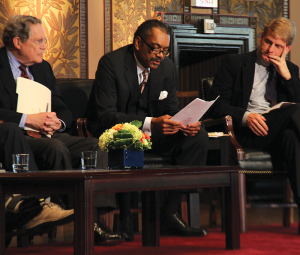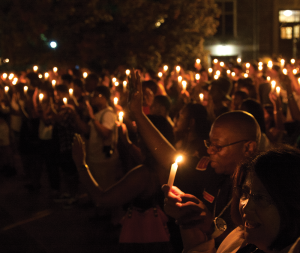
A student-led vigil and a panel discussion between university scholars this week spurred reflection and action on Georgetown’s campus, two and a half weeks after the fatal shooting of Michael Brown in Ferguson, Mo.
“It’s been 50 years since Freedom Summer, 50 years since the Civil Rights Act, 50 years since Dr. King won the Nobel Peace Prize, and what we’ve experienced in the past two weeks is a recognition of the unfinished work of this republic, the unfinished work of seeking to realize the American Dream, the unfinished work of the American idea, the unfinished work of the American project,” University President John J. DeGioia said at Tuesday’s vigil. “Two hundred and thirty-eight years later we recognize that the work of this republic is unfinished.”
The Black Leadership Forum organized the vigil, which included comments by assistant professor of history Marcia Chatelain, who has been organizing online discussions about how to teach students about Ferguson through the hashtag #FergusonSyllabus, associate professor of history and African-American studies Maurice Jackson, Rev. Raymond Kemp, DeGioia and various student speakers.
“I look here and I see what is wrong with America, but you young people — you are going to save the future of America,” Jackson said at the vigil, reflecting on solutions to white privilege and police militarization.
Continuing the conversation on Thursday evening in Gaston Hall, Provost Robert Groves moderated a panel discussion with university-affiliated scholars including Chatelain, Jackson, sociology professor Michael Eric Dyson, government professor Douglas Reed and Georgetown University Law Center professors Paul Butler and Peter Edelman.
Groves began the forum by acknowledging the emotional gravity of the situation.
“In Ferguson, we’ve all seen video images that shocked us, another life cut down, never to fulfill its promise,” Groves said.“And so it’s understandable that our first responses are emotional. As we continue to reflect, we must engage new ideas and perspectives that deepen our understanding. So it is important, I think, that we bring to bear at this moment, at this time all the knowledge and wisdom of those who devoted their lives to the study of race and intergroup relations.”
Butler continued the discussion by explaining the laws and structures that give power to police departments in America. He referenced Section 1033 of the National Defense Authorization Act, which provides police departments with surplus military equipment, such as grenade launchers and tanks, for free.

A student-led vigil began a week of prayer and reflection among Georgetown students and faculty on the ongoing crisis in Ferguson, Mo.
“When these departments get this equipment, they have to use it within the year, otherwise they have to give it back to the Pentagon. So think of the perverse incentives that provides the police,” Butler said, stating that the American people also have legal protections including the right to film the police and the right to protest.
Chatelain commented on the national impact of Brown’s death, citing the persistence of Ferguson protestors.
“We no longer think of social unrest as a problem of sociologists but as a problem of all engaged people,” Chatelain said. “You’re seeing this from an interdisciplinary lens. This isn’t just an economic problem and this is just not a problem from lawyers, but it’s a problem for all of us.”
Stating that poverty and racism drive tragedies like Brown’s death, Dyson said that there are excruciating conflicts in cities like Ferguson between residents and people like police officers who occupy social and urban spaces.
“The problem with the police is when they show up, they often can’t make a distinction between who was the ostensible criminal and the criminalized black person. That’s because there’s a preconception of what black people are likely to do,” Dyson said. “The criminalization of black people is a devastating consequence of four centuries of rejection and repudiation of the humanity of black people. What we saw there was the inability to see a black person as a human being.”
Butler and Dyson expressed disappointment in President Barack Obama’s lack of commitment to racial justice, stating that politicians need to lead national change and that programs like education initiative My Brother’s Keeper are inefficient and misguided.
“We need to make our leaders more accountable for race, starting with President Obama. When he was elected …there was measured optimism that he would make racial justice part of his platform and he has not. Now, when he reluctantly talks about race it seems more like he’s explaining to white people how black people feel. We need less translation and more real leadership,” Butler said. “Barack Obama is a brilliant man and if he uses his last two years of presidency to focus on racial and economic inequality, what a wonderful legacy that would be.”
Reed recommended changes at the university level, noting the absence of students and professors of color in Georgetown’s classrooms.
“The university does two things primarily — research and teaching — and if we’re really going to be serious about this we need to invest in the programs and the capacity of the faculty to do research on this. In American government, my department, we don’t have someone who teaches on race,” Reed said. “That absence leads to an absence of knowledge at the university that has consequences.”
Students, who filled Red Square for the vigil and packed Gaston Hall for the panel, expressed support for university and student efforts.
“Anything like this is important, just like the Trayvon Martin case. We want to shed light on any injustice at Georgetown, as the type of school that we are and the importance we have to the country,” Jabril Trawick (COL ’15), who attended the vigil, said. “I think that our doing this helps open our eyes toward justice. This is important because it influences other people; it influences other universities. It’s great to be a leader in something like this.”















thegemini7 • Sep 1, 2014 at 12:47 pm
And so now we are to define kangaroo courts as vigils” and “panel discussions?” But of course: where else but at Georgetown and Through The Looking Glass.